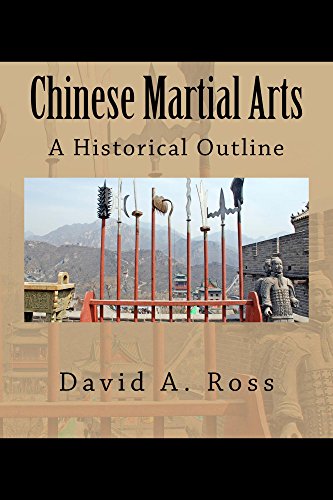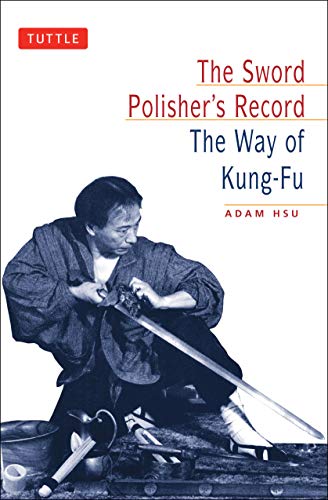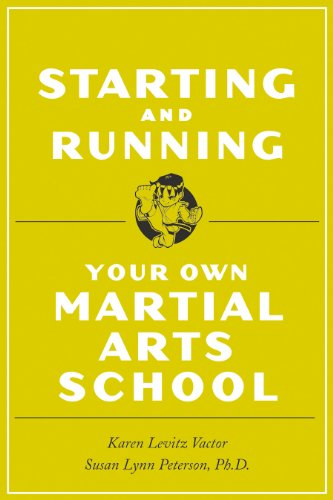(Part 2) Top products from r/kungfu
We found 21 product mentions on r/kungfu. We ranked the 65 resulting products by number of redditors who mentioned them. Here are the products ranked 21-40. You can also go back to the previous section.
21. Chinese Martial Arts: A Historical Outline
Sentiment score: 0
Number of reviews: 1
 Show Reddit reviews
Show Reddit reviews22. Moving Toward Stillness: Lessons in Daily Life from the Martial Ways of Japan
Sentiment score: 1
Number of reviews: 1
 Show Reddit reviews
Show Reddit reviews23. Chronicles of Tao: The Secret Life of a Taoist Master
Sentiment score: 1
Number of reviews: 1
 Show Reddit reviews
Show Reddit reviews24. Scholar Warrior: An Introduction to the Tao in Everyday Life
Sentiment score: -1
Number of reviews: 1
 Show Reddit reviews
Show Reddit reviews26. Acupuncture: The Ancient Chinese Art of Healing and How it Works Scientifically
Sentiment score: -1
Number of reviews: 1
 Show Reddit reviews
Show Reddit reviews27. The Gift of Fear and Other Survival Signals that Protect Us From Violence
Sentiment score: -1
Number of reviews: 1
Dell Publishing Company
 Show Reddit reviews
Show Reddit reviews28. You Are What You Eat: The Plan That Will Change Your Life
Sentiment score: 1
Number of reviews: 1
 Show Reddit reviews
Show Reddit reviews29. Peace Is Every Step: The Path of Mindfulness in Everyday Life
Sentiment score: 1
Number of reviews: 1
peace moment zen master spiritual leader positive true selves mindfulness present
 Show Reddit reviews
Show Reddit reviews30. Warrior Origins: The Historical and Legendary Links Between the Bodhidharma's, Shaolin Kung-Fu, Karate and Ninjutsu
Sentiment score: 1
Number of reviews: 1
 Show Reddit reviews
Show Reddit reviews31. The Sword Polisher's Record: The Way of Kung-Fu (Tuttle Martial Arts)
Sentiment score: 1
Number of reviews: 1
 Show Reddit reviews
Show Reddit reviews32. The Shaolin Grandmasters' Text: History, Philosophy, and Gung Fu of Shaolin Ch'an
Sentiment score: 0
Number of reviews: 1
 Show Reddit reviews
Show Reddit reviews33. Starting and Running Your Own Martial Arts School
Sentiment score: 2
Number of reviews: 1
Used Book in Good Condition
 Show Reddit reviews
Show Reddit reviews34. One Hundred Unorthodox Strategies: Battle And Tactics Of Chinese Warfare
Sentiment score: 1
Number of reviews: 1
 Show Reddit reviews
Show Reddit reviews35. The Shaolin Monastery: History, Religion, and the Chinese Martial Arts
Sentiment score: 1
Number of reviews: 1
 Show Reddit reviews
Show Reddit reviews36. Miyamoto Musashi: His Life and Writings
Sentiment score: 1
Number of reviews: 1
Used Book in Good Condition
 Show Reddit reviews
Show Reddit reviews37. Choy Li Fut Kung Fu: The Dynamic Fighting Art Descended From the Monks of the Shaolin Temple
Sentiment score: 1
Number of reviews: 1
Used Book in Good Condition
 Show Reddit reviews
Show Reddit reviews38. Principles, Analysis, and Application of Effortless Combat Throws
Sentiment score: 1
Number of reviews: 1
Used Book in Good Condition
 Show Reddit reviews
Show Reddit reviews


https://en.wikipedia.org/wiki/Four_Great_Classical_Novels
These are great reads, particularly Romance of the Three Kingdoms and the Water Margin. There is a modern martial arts film called Chi Bi, or Red Cliff that you might have heard about that is based on RotTK. That book is about 2,000 pages long, but there is an abridged 500 page one that is pretty good. One of the characters in that book, Zhuge Liang, also known as Konming, is one of the best military strategists who has ever lived. He wrote a commentary based on the book The Art of War, which a lot of martial artists read.
You should definitely check out The Art of War by Sun Tzu and
Mastering the Art of War by Zhuge Liang http://www.amazon.com/Mastering-Art-Shambhala-Dragon-Editions/dp/0877735131
Another good book is 100 Unorthodox strategies http://www.amazon.com/One-Hundred-Unorthodox-Strategies-Tactics/dp/0813328616/
It contains many stories about famous battles in ancient China and how various warlords tricked or outmaneuvered others in battle in very creative ways.
There is also a series of comic books translated from the Chinese that deliver certain ancient texts or biographies of ancient China in a great format http://www.amazon.com/Confucius-Speaks-Tsai-Chih-Chung/dp/0385480342
The author is Tsai Chih Chung and he has written over 100 of these books.
The literature of ancient China is useful because it was highly influential on Chinese and indirectly Japanese martial arts. Principles of Taoism, Confucianism and Buddhism can be found in martial arts philosophy.
Some books, like the 4 classics I mentioned above, were so widely written that there are huge elements found in every aspect of the modern day. Romance of the Three Kingdoms is sort of how the English view Robbin Hood and King Arthur. It basically defines their culture. The glaring example of how Journey to the West has modern influence is that the popular Japanese Anime Dragon Ball Z is loosely based on a Japanese version of the same story.
Water Margin is notable because certain forms of kung fu described in that book are still practiced today like Poking Foot Kung Fu also known as Water Margin Bandit Style https://www.youtube.com/watch?v=gq8GIdVumFo
As you said, different people consider different nutritional choices to be healthy, and I don't place any particular extra value on Bruce Lee's opinion. His name gets dropped and people think the conversation is over because no one is allowed to question anything he ever said or did, but I take his teachings with a big old grain of salt. Don't get me wrong, he was good, and I appreciate all he did to bring Kung Fu to the mainstream, but he was a very young master, and I think many of his philosophies would have changed significantly had his life not been cut so tragically short. Yes, he was into healthy eating and raw food, but he was also into eliminating forms entirely from his style's curriculum, which is something that does not jive with me even a little.
So anyway, if you're curious about what other people eat, here you go. I am in excellent physical shape in regards to both Kung Fu and my physical health. I don't abide by any particular diet plan, but I try to follow the patterns described in this book. I try to avoid heavily processed food and almost never eat junk food. I never eat fast food and never drink soda (I drink seltzer instead.) I try to eat organic food as often as possible, and, as I feel part of being a martial artist is also being a good citizen, I try to buy locally to support my community, which admittedly can be difficult.
I eat almost the exact same thing every day, at least during the week when I'm working. Breakfast is either cereal or oatmeal, or if I'm feeling really fancy/have the time, eggs or pancakes. I'll have a fruit for a snack later in the morning, usually an apple. For lunch I almost always have a sandwich, which several slices of meat and ton of veggies; lettuce, tomato, onion, pickles, avocado. I'll have a veggie for a snack later in the day, usually celery, then right before I leave work I'll have a yogurt. I will only eat dinner if I have time, which is only two or three nights per week. In the interest of money it's usually something simple like pasta, but I will occasionally cook a healthier dinner with meat and vegetables. I also cheat being healthy occasionally and have something naughty like ice cream or peanut butter and Nutella on toast. I exercise every day; I practice Kung Fu 4 days a week and work out at the gym the other 3, and sometimes to help with that I will drink a protein shake (usually Sigma 6) once per day, but that stuff is REALLY expensive, so those benders usually don't last long.
There is some variation, especially on weekends, but for the most part, that's how I roll. I hope you find this helpful.
I like the book Warrior Origins but I'm not 100% sure how it is regarded in the academic community. In it, he asserts that Bodhidharma was a Persian prince who probably just passed through India, not an Indian prince as most people say. It has lots of other cute tidbits.
The history of kung fu is a twisty and often overgrown, obscured, or washed-away path. As much as I love the subject, deciding to write a history paper on it sounds like something I'd decide to do in the midst of a bipolar manic high and come to regret as reality sets in.
Your best bet might be to focus on one CMA discipline, either one that is well-documented like shuai jiao or one that is relatively young like Baguazhang. Many books have a little blurb in the beginning on the supposed origins of the art they describe, but oftentimes they contradict the stories given in other books on the same art, because sometimes masters will make sh*t up just to make their art sound cooler than other arts and get more students.
Horse stance training! set a timer and hold your stances. Call out the names too. blocks are easy to practice in the air even without contact equipment. This is a pretty good book if you can get your hands on it. it's kind of rare and out of print though.
Source: Choy Li Fut instructor.
Some books:
Fairly sure that Qi Magazine can now be accessed online for free, and the Journal of Baguazhang.
Tim doing Ba Gua's version of push hands
There are some clips of Tim sparring and competing in the beginning and end of this vid
Tim has been around the chinese internal arts and bjj scene for quite a while. He's known for combining the two. Using internal arts for stand up grappling (he has a fairly well known book on the subject) and bjj for ground work. Here's the episode of Rolled Up with Tim. You might find it interesting.
If literary sources are available and you're interested enough to spend a few bucks on it, there's quite a bit of stuff available. In case you haven't already done so, consider changing "kung fu" to "Chinese martial arts" in your search queries. For example, I just did search that on Amazon Kindle store, and this book (which, admitted, I haven't read but probably will buy...) is five bucks on Kindle.
For internal arts, see Brennan Translation, but however cite the original sources with a note "translated by Paul Brennan".
Shaolin Grandmasters Text - ISBN-10: 0975500910
ISBN-13: 978-0975500910
This book seems to divide opinion but worth a read if you can find a copy.
http://www.amazon.co.uk/Shaolin-Grandmasters-Text-History-Philosophy/dp/0975500910/ref=sr_1_fkmr2_2?ie=UTF8&qid=1333140228&sr=8-2-fkmr2
Self defense is another hornet's nest, where everyone seems to have a different opinion on what "self defense" entails. Is it being able to beat someone in a straight-up 1-on-1 fight? Is it simply being able to do enough damage to escape? Does it entail multiple attackers? Is it being able to fight yourself out of any and all situations? Or is it the ability to simply run as fast as you can? Browse /r/martialarts any day of the week and chances are you'll see a thread arguing about what constitutes "self defense."
If your focus is solely on the idea of self defense, I would highly recommend two books: The Gift of Fear, which talks about recognizing situations and signals that a situation is going to turn bad, and Meditations on Violence, which talks about the different kinds of violence and how martial arts training fares in real-life situations. Both are excellent reads and extremely enlightening.
No, no no no.
Too Mary Sue for my taste.
I much preferred The Initiate Brother, or Across the Nightingale Floor.
Peaceful Warrior is a book about a college student who meets a master and learns the philosophical side of Kung Fu.
I have not yet read Scholar Warrior yet but its a book about applying Kung Fu to everyday life.
Here is good book on Chinese acupuncture, which is a very useful skill that can be used to either hurt or heal another person